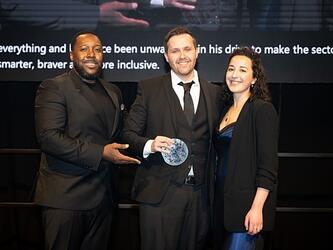Obituary: Geoffrey Roughton
Geoffrey Roughton was a distinguished founding gold patron of the Archive of Market and Social Research (AMSR) and made an immense contribution to its success, both as a founder and an untiring volunteer.
He was one of the ‘three wise’ people who conceived the archive before its current position as an active and vibrant charity. John Downham, Liz Nelson and Geoffrey laid the foundations of AMSR – they were the ‘grandparents’ of the idea.
Geoffrey’s career in market research began in 1955 with Television Audience Measurement Ltd, which started the first metered TV audience measurement service in Europe.
He went on to found MAS Research Ltd in 1957 (later absorbed into TNS). He was MAS’s director in charge of The Londoner, the first major survey in Britain (and Europe) to be analysed on a computer. MAS then became the first market research company to have a computer (an IBM 1130 ) on its own premises.
After selling MAS, he joined Alan Hendrickson in Pulse Train Ltd in 1986. He went on to become chairman and chief executive of Pulse Train Ltd in 1998 before being joined by Pat Molloy and later merging Pulse Train with Confirmit AS in 2007. His third career was as chief executive of X-MR.
Geoffrey believed strongly that we have a debt to the next generation of researchers to make them aware of where they are coming from. He maintained that we make history by what we do; we pass it to future generations by recording it and making those records readily available, not just for researchers, but society as a whole.
Geoffrey was responsible for the scanning system given to AMSR by the former shareholders of Pulse Train Ltd in memory of Alan Hendrickson. The material, which is scanned by volunteers before it goes to the HAT, is the bedrock of our Archive collection. In addition to his generous support for the Archive, Geoffrey did a tremendous amount of charitable work, especially for the Heart Foundation.
Liz Nelson said: “I have known Geoffrey since the late 1950s. I remember him as a remarkably quick and very intelligent person. He was always imaginative and very, very confident about his intellectual powers. He was entrepreneurial and wanted to run his own company from day one. He and his friend, John Robertson, began a company, not called MAS in those days, but one dedicated to survey analysis.
“It was a joy to work with him and John when we were planning the archive and we shared the pleasure of seeing the success of our dream.”
John Downham said: “Geoffrey was a researcher who managed to combine strong technical ability – he was someone who appeared to be at home in both the academic and the business worlds – with commercial skills. I always felt that MAS was a company with a strong ethical background which reflected Geoffrey’s own character – for me, a very important part of the appeal of the profession in the years following World War II. He was an entertaining companion with a store of business and other anecdotes, and I shall miss him. The research world is a less colourful place without him.”
Adam Phillips said: “Geoffrey was excited by new ideas and the application of technology to understanding how people behave. I first encountered Geoffrey when Mass Observation acquired Pulse Train’s survey analysis software. We used it to create a decentralised international telephone survey system for a radical new type of survey.
“The CTS was designed to provide the Eurobarometer with a rapid continuous opinion tracking system that could measure the impact of unexpected events on European public opinion. At the time it was the most sophisticated telephone survey in the world. Geoffrey was very excited about the idea and committed considerable resources at Pulse Train to help us establish a service which no-one believed possible at that time.
“We worked together again on the start-up of AMSR. His enthusiasm and grasp of the critical elements needed for success, like making the entire archive available online, was a very important contribution to AMSR’s subsequent success.”

We hope you enjoyed this article.
Research Live is published by MRS.
The Market Research Society (MRS) exists to promote and protect the research sector, showcasing how research delivers impact for businesses and government.
Members of MRS enjoy many benefits including tailoured policy guidance, discounts on training and conferences, and access to member-only content.
For example, there's an archive of winning case studies from over a decade of MRS Awards.
Find out more about the benefits of joining MRS here.













0 Comments